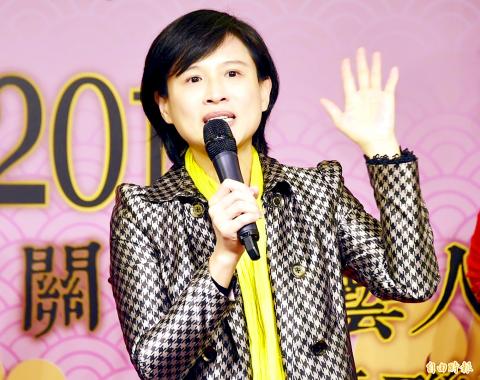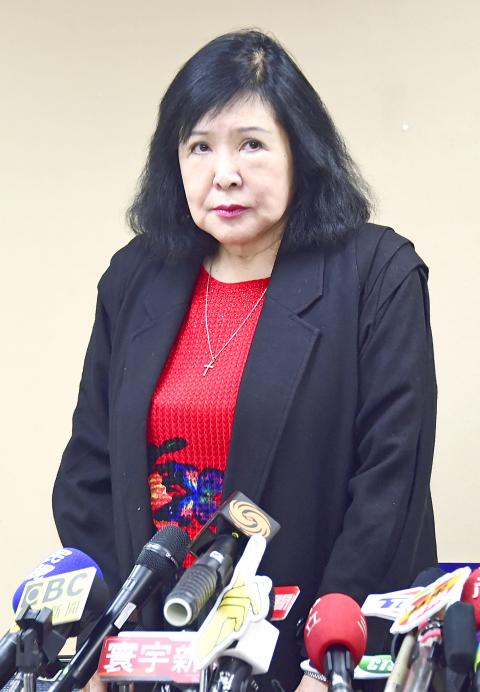A veteran entertainer yesterday slapped Minister of Culture Cheng Li-chiun (鄭麗君) in the face, saying she was upset with the minister’s attempts to “discredit” Chiang Kai-shek (蔣介石) and his son, former president Chiang Ching-kuo (蔣經國).
The incident occurred at a lunar year-end banquet in Taipei attended by veteran entertainers to mark the end of the Year of the Dog, the Chinese-language Mirror Media magazine reported.
The minister was going from table to table toasting the attendees when Lisa Cheng (鄭心儀), 67, slapped her in the face and then returned to her seat, footage taken at the event showed.

Photo: Pan Shao-tang, Taipei Times
Cheng Li-chiun gasped and put her hand on her cheek, looking surprised and confused.
Asked why she hit Cheng Li-chiun, Lisa Cheng, who is also known as Cheng Hui-chung (鄭惠中), said: “I had intended to slap her twice. I had been thinking about this for months... I went easy on her by slapping her just once.”
Lisa Cheng said that she “had to do it,” because meeting the minister was a “rare occasion.”

Photo: Pan Shao-tang, Taipei Times
The minister has been “ungrateful” by pushing policies to abolish Taipei’s Chiang Kai-shek Memorial Hall and ignoring the Chiangs’ contributions to the nation, she said, adding that Cheng Li-chiun “had it coming.”
The minister declined to comment on the attack when leaving the venue, but later wrote on Facebook that she did not personally know Lisa Cheng.
While Taiwanese society embraces diversity and freedom of speech, people should not use violence to express their opinion, she wrote.
Her personal humiliation was insignificant next to safeguarding Taiwanese democracy, Cheng Li-chiun wrote, urging the public not to resort to violence when discussing public issues.
Accompanied by Chinese Nationalist Party (KMT) Taipei City Councilor Angela Ying (應曉薇), Lisa Cheng later told a news conference at the Taipei City Council that she had lost control of her emotions because of the ruling Democratic Progressive Party’s policies aimed at “discrediting the Chiangs.”
She said she would apologize to the minister, but would not apologize for her position on the memorial.
Leo Chuang (莊豐嘉), general manager of Chinese Television System (CTS, 華視), which hosted the banquet, said at a separate news conference that the network would sue Lisa Cheng on behalf of the minister, adding that it denounces any form of violence.
The Ministry of Culture last year held a series of workshops to discuss transforming the memorial, but has not said whether it would demolish or abolish it.
Last month, the ministry said that it had drafted two options for repurposing the memorial, which would be submitted to the Executive Yuan for interdepartmental discussions before they are made public.

ENDEAVOR MANTA: The ship is programmed to automatically return to its designated home port and would self-destruct if seized by another party The Endeavor Manta, Taiwan’s first military-specification uncrewed surface vehicle (USV) tailor-made to operate in the Taiwan Strait in a bid to bolster the nation’s asymmetric combat capabilities made its first appearance at Kaohsiung’s Singda Harbor yesterday. Taking inspiration from Ukraine’s navy, which is using USVs to force Russia’s Black Sea fleet to take shelter within its own ports, CSBC Taiwan (台灣國際造船) established a research and development unit on USVs last year, CSBC chairman Huang Cheng-hung (黃正弘) said. With the exception of the satellite guidance system and the outboard motors — which were purchased from foreign companies that were not affiliated with Chinese-funded

PERMIT REVOKED: The influencer at a news conference said the National Immigration Agency was infringing on human rights and persecuting Chinese spouses Chinese influencer “Yaya in Taiwan” (亞亞在台灣) yesterday evening voluntarily left Taiwan, despite saying yesterday morning that she had “no intention” of leaving after her residence permit was revoked over her comments on Taiwan being “unified” with China by military force. The Ministry of the Interior yesterday had said that it could forcibly deport the influencer at midnight, but was considering taking a more flexible approach and beginning procedures this morning. The influencer, whose given name is Liu Zhenya (劉振亞), departed on a 8:45pm flight from Taipei International Airport (Songshan airport) to Fuzhou, China. Liu held a news conference at the airport at 7pm,

GRIDLOCK: The National Fire Agency’s Special Search and Rescue team is on standby to travel to the countries to help out with the rescue effort A powerful earthquake rocked Myanmar and neighboring Thailand yesterday, killing at least three people in Bangkok and burying dozens when a high-rise building under construction collapsed. Footage shared on social media from Myanmar’s second-largest city showed widespread destruction, raising fears that many were trapped under the rubble or killed. The magnitude 7.7 earthquake, with an epicenter near Mandalay in Myanmar, struck at midday and was followed by a strong magnitude 6.4 aftershock. The extent of death, injury and destruction — especially in Myanmar, which is embroiled in a civil war and where information is tightly controlled at the best of times —

Taiwan was ranked the fourth-safest country in the world with a score of 82.9, trailing only Andorra, the United Arab Emirates and Qatar in Numbeo’s Safety Index by Country report. Taiwan’s score improved by 0.1 points compared with last year’s mid-year report, which had Taiwan fourth with a score of 82.8. However, both scores were lower than in last year’s first review, when Taiwan scored 83.3, and are a long way from when Taiwan was named the second-safest country in the world in 2021, scoring 84.8. Taiwan ranked higher than Singapore in ninth with a score of 77.4 and Japan in 10th with